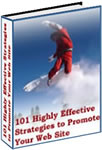14 Ways to Add Content to Your Web Site
By
Herman Drost
When I surf the Net, I often see web sites filled
with
beautiful graphics that strive to capture my attention.
Well, they do so for an instant, however I click away when
I don't immediately find relevant content. The content you
add to your web site needs to attract both visitors and
search engines.
Part I - How to add content to your web site to attract
visitors
Part 11 - How to add content to your web site to attract
the search engines
14 ways to add content to your web site and attract
visitors
1. Get into the mind of your visitor. Brainstorm
all the
ways your visitor would think of your product. Write your
content as if you are sitting next to him/her explaining
your product. Don't write in the 3rd person ie we, they,
but use I, you, or your. This makes it more personal.
2. Keep it simple - write as if explaining your web
site
material to a 7th grader (12-13 year old). Don't use
complicated words that people would have to look up in the
dictionary. You want them to understand clearly what your
site is about.
3. Convey emotion - people on the Web are often in
a great
hurry, so you need to appeal to their emotions to stop
them
clicking away to the next site. Use stories, convey your
experiences or include testimonies from others. This adds
to your credibility and trust, 2 essential factors for
doing business online.
4. Communicate quickly and efficiently - people
online tend
to scan rather than read everything on the page. Therefore
use single lines of text for your headings and sub
headings. Catch your visitor's eye with lists, bullet
points and use short, snappy, active (not passive) words
in
your sentences. Your paragraphs should only consist of 2-5
sentences. Long paragraphs make it hard to read (scan)
your
page quickly.
5. Create white space - the layout of your web page
should
include plenty of white space. Don't lean text hard up
against your graphics. Include white space between
headings, sub headings and paragraphs.
6. Use graphics sparingly - you have heard it said,
"a
picture is worth a 1000 words." That's true but only if
the
picture supports your content. Don't overdo the graphics.
You may impress your visitors initially, however to keep
them interested in your site, you need high quality
content.
7. Create high quality content - make clear points
with
each paragraph you write. Each paragraph should build on
the previous one, so that you are pulling your visitor
through your page naturally. You are trying to pre sell
the
product or service to your visitor. This puts them in a
natural frame of mind to buy (unlike many sites which may
just have pictures of the products and a shopping cart).
8. Web page background - a colorful or busy
background can
make your text hard to read and may give the impression of
an inexperienced webmaster. If you do use a background
image make sure it complements your site's theme, fits
with
your visitors experience and will increase your
credibility.
9. Use the correct fonts - the offline world
primarily uses
"Times New Roman". This works well in print but not
online.
Sans Serif fonts, such as Arial, Verdana and Helvetica are
the best fonts for easy online scanning.
10. Font colors - the best colors for reading
online are
black text on a white or off-white background. If you want
to use multiple colors only use a maximum of 3. Too many
text colors on a web page make it hard on the eyes and
spell inexperience. To emphasize text you can use the bold
tag (<B>this text will appear bold</B>) or italic tag
(<I>this text will appear in italics</I>).
11. Check spelling and grammar - run your page
through
spell check in your word processor. It won't pick up all
the mistakes, so make sure you read it through yourself to
find other errors. Spelling and grammar mistakes convey an
unprofessional impression.
12. Simple navigation - the main purpose of the
navigation
bar is to make it easy for your visitor to find his way
around your site. Place your navigation bar on the left
side or top of your page (or both). Repeat the bar at the
bottom of the page so your visitor does not have to scroll
back up to move on to another section. ( Read my article
" How to
Create an Effective Web Site Navigation Structure "
13. Get a critique - don't fall in love with your
writing
and leave it there. Yes, it's hard to listen to someone
criticizing your beautiful piece of work, but swallow your
pride and get your friends or family members to do a
review
of your web page. This will help you to refine what you
have written and make it appeal to a wider audience.
14. Use specific keywords - weave targeted keywords
into
your web page as you write your web page content. I'll
cover "How to Write for the Search Engines" in Part II of
this article.NOTE: To gain a more in-depth
understanding of how to
make your content pre-sell your product or service,
pick up your copy of the 159 page e-book TODAY titled:
Make
Your Content Pre Sell
| Subscribe
FREE to
Marketing
Tips Newsletter
NEW
Ebook
101 Highly Effective
Strategies to Promote Your Web Site

Hosting
from $30/year
|